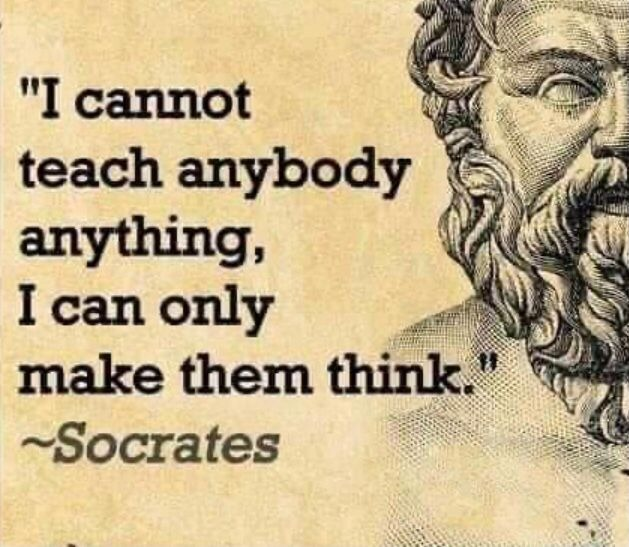Reflection as an academic subject
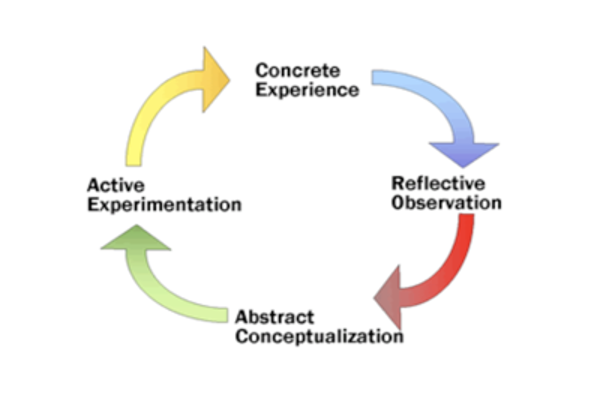
Reflection may be something that we all do but many people do not think about doing it. Is this the right or the only approach?
The art of Reflection is undervalued in a high-voltage, media-frenzied world. Instead, ‘meditation’ has acquired a new-found meaning with an impetus accorded it by charismatic publicists, a corpus of literature and a rainbow of groups that all but corral people who might have wanted to reflect on whatsoever pleases them and is of use in their daily lives into the groove of this specific philosophy of life and living. It may not be tapered to everyone’s need, however worthwhile.
Reflection was subject of Confucian writing and had traction in the ancient Greek world, notably through the ideas of the philosopher Socrates. The modern theory of self-awareness and emotional growth through the development of intrapersonal and interpersonal skills and social relationships draws heavily on the Socratic ‘Know thyself!’.
We can go back to first principles. Reflection can colonise a mental and spiritual terrain vacated by the departure of meditation from some of its former meaning when the two concepts were almost synonymous.
The rapidity and ubiquity of modern modes of communication foster a general attitude that is closer to a ‘knee-jerk’ than a ‘Look before you leap’. Letter writing and ‘sleeping on an issue’ seems passé. People let fly with opinions, often shrill, and olde-world courtesies often are seen as quaint rather than de rigeur. Time soaked up in allowing all aspects of a problem to come to light, not just initial reactions, do not sit comfortably with the pressures instanced by email or more insidious pressures encapsulated in the phrase ‘Action this day!’ As for letter writing! Leave that to the Victorians and their occasional modern if fustian counterparts…!
The academic world is alert to this trend and has sterling advice that is only signposted rather than thundered from its ivory towers. Where is its educator with a megaphone at his or her disposal.
The world is legitimately our oyster to open! We can allow ourselves leeway to survey the entire panoply of human experience. This has a charm and a value all its own. This virtual Institute is in part designed to help push open that door that is too often left only ajar. It helps put flesh on the bones of which the spinal chord are the principles behind Reflection (see below). Note the capital ‘R’. Reflection, properly conducted, is a tool for clearer thinking.
People frequently treat the opinions of others as saving them the time to think things through for themselves, as if they too would have worked out the same routes if but they had allowed themselves the time to think about them. This institute helps ideally to open lazy eyes as to the many and varied things about which one personally can choose to reflect. Reflection is a starting block, a technique that is but the start of a journey of discovery and self-discovery that will vary at least in detail from person to person. With reflection in the knapsack of our habits we go forth into the outside world flexed the better for cogitating on the significance of what we find there. It is a stepping stone to something beyond itself.
The study of Reflection counteracts the trend of its neglect. Studies are afoot out to make it a recognised mental and academic discipline. The rationale is to enhance better lifestyles and decision-taking and to encourage objective and open-minded thinking, innovation, personal fulfilment and emotional intelligence.
Who are the teachers who take REFLECTION as an academic discipline? What is their rationale? Click on the landing box below for the basic principles. What form do these studies take? The following section has details of some of the many practitioners, educators and psychologists who engage or engaged in the study of Reflection as a technique.
A General look at the metier of Academic studies of Reflection
Most of us reflect superficially about what we are doing during events or experiences in daily life. Some call this ‘thinking on our feet’ – a metaphor based on thinking while acting, which contrasts with more deliberate concentrated thought. This expression ‘thinking on our feet’ often refers to a lack of preparation or reacting to a surprising situation, although its deeper meaning is that we are reflecting about a situation ‘in the moment’, in a broad external sense and an internal personal sense. While reflecting ‘in the moment’ is valuable and can produce effective immediate solutions, we might not develop these reflections beyond the event itself, and not retain these valuable pieces of reflective learning when moving on to other tasks. If however we think more proactively, a more deliberate reflection can generate conclusions and actions for future improvements, preventing repeated mistakes, and other positive changes.
Note: Apologies are tendered to the educators and academicians whose websites or teachings are not featured herein. Suggestions of further suitable studies are welcome as additions.
***
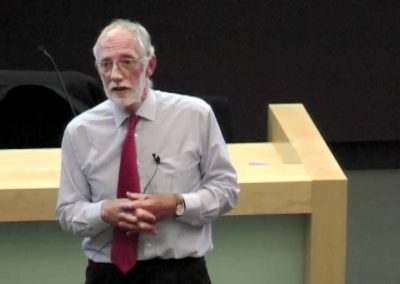
Graham Gibbs‘ Reflective Cycle

Mark Twain’s Thinking on Reflection

Introduction to theory
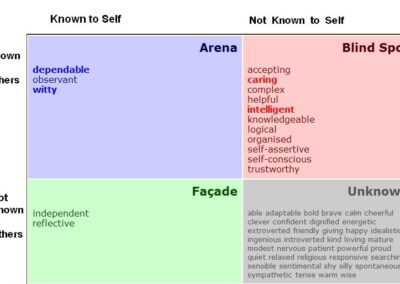
Reflective Practice

Have you Suffered a Bereavement?
The Theory of the Institute

Statement of Principle
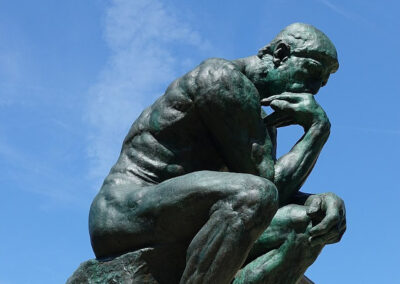
Are You Undergoing a Divorce?

A call for reflection

Ways to Prepare for Reflection

Reflection: its rationale

Silence is Golden
Some Definitions
Reflective Practice is an ancient concept. There are references to the power of reflective learning in the writings of Confucius, around 460BC, and the ancient Greeks practised ‘reflection’ as a form of contemplation in search of truth. Their ancient meaning of reflection features in several modern definitions.
The following definitions convey distinct meanings of Reflection:
- “Careful thought or consideration..” Wikipedia, 2015.
- “Serious thought or consideration…” Oxford English Dictionary, 2006.
- “Quiet thought or contemplation…” Collins Free Dictionary, 2003.
- “The action of turning (back) or fixing the thoughts on some subject; meditation, deep or serious consideration… (and philosophically) the mode, operation or faculty by which the mind has knowledge of itself and its operations, or by which it deals with the ideas received from sensation and perception…” Oxford English Dictionary, 1922.”…A mental process of thinking about what we have done, learned and experienced…” Professor Jenny Moon, teaching expert and author, 1999.
- Reflect – “Turn one’s thoughts back on, meditate on, ponder..” Chambers Etymology
- Reflective Practice – “…the capacity to reflect on action so as to engage in a process of continuous learning…” (Schon 1983:102-104), and “…paying critical attention to the practical values and theories which inform everyday actions, by examining practice [life/work experiences] reflectively and reflexively. This leads to developmental insight…” (Bolton 2010:xix) Wikipedia, 2015.
- Reflexivity – “Finding a way to stand outside ourselves to get a more objective view of ourselves…” Kitchener, 1983
- Critical self-reflection – “To know how and to what extent it might be possible to think differently, rather than legitimating what is already known … a test of the limits that we may go beyond” Michel Foucault, 1992.
- Critical Reflection – “The [Brookfield] ‘Lens theory’ suggests that apart from reflecting on our own personal beliefs, we reflect through other ‘lenses’, on multiple perspectives including theory…” Brookfield, 1995.
- Reflector, critical reflector, non-reflector – Terms derived from the above, referring to people and the type/extent of reflection they use. For example ‘the reflector’ refers to a person who uses reflection of some sort. A ‘critical reflector’ more specifically refers to someone who uses Reflective Practice as a learning tool to question and evaluate themselves, others and situations. A ‘non-reflector’ is a person who rarely or never uses reflection. The terms are used commonly in academic or technical writing, when describing or reporting on reflective methods and activities.
Metacognition
- “…To monitor our own learning progress to become aware of the limits of our own knowledge and values, assumptions and expectations (frames of reference)…” Kitchener, 1983.
- “Knowing about knowing” and “Cognition about cognition.” Traditional informal definitions, Wikipedia 2015
- “Awareness and understanding of one’s own thought processes.” OED, 2006.
Experts and Practitioners
Barbara Larrivee
Barbara Larrivee, teaches Reflective Practice at the Department of Learning, University of California, has written particularly about the use of Reflective Practice in classroom teaching, notably ‘Transforming Teaching Practice: Becoming the critically reflective teacher‘ (2000) and ‘Authentic classroom management: Creating a learning community and building reflective practice‘ (2005).
Professor Larrivee agrees that insightful experience can trigger changes in outlook, necessary for critical Reflective Practice.
Reflecting on action gives us time to look back at what happened in a more measured and objective way. This builds on Dewey’s concept of a purposeful reasoned process, delaying impulsive action to allow reflective judgement for action (1933).
Carl Rogers
Carl Rogers was an American psychotherapist and author. His books include ‘Client centered Therapy’ (1951), and ‘Becoming a Person‘ (1961).
Carl Rogers asserted that self-awareness is crucial for personal growth. He regarded critical reflection as vital for promoting learning and self-assessment, enabling us to identify and evaluate our skills and development needs. This leads to more proactive personal and professional development planning and continuing professional development (CPD). Self-reflection helps us to develop problem solving skills and find solutions in planning action for behaviour change. In reflecting on experiences, we can understand how we learn, start to observe our own progress in learning, limits of understanding, and develop more effective critical thinking skills by questioning and analysing our own and others’ behaviour. In this way, we can begin to understand ourselves and be more self-critical in a positive way.
Rogers was a particular expert on empathy (understanding other people’s feelings) and a great advocate of the importance of empathy in objective thinking, which is explained later in Reflective Practice objectivity.
Daniel Goleman
Daniel Goleman, an American psychologist, author and science journalist, wrote the best-selling 1996 book ‘Emotional Intelligence‘ and is jointly acknowledged as originating and defining the EQ concept. (Emotional Intelligence is popularly abbreviated to EQ) EQ significantly alludes to and contrasts with IQ (Intelligence Quotient), because EQ theory tends to regard IQ as a highly limiting way to measure human intelligence, and especially to judge broader human capability.
• Self-awareness
• Social awareness
• Self-management
• Relationship Management
The use of self-reflection should be regulated by the situation, which acknowledges the potential of reflective techniques to open deep personal issues, which may not be appropriate. For example, in the context of work-based management training, EQ-driven self-awareness should be explored safely within agreed professional boundaries, so as to avoid being too personal or introspective.
Donald Schön
Donald Schön an American philosopher, author, and Professor at Massachusetts Institute of Technology, produced a series of books on learning, Reflective Practice, and significantly, the development of reflective practitioners.
Schön distinguishes between reflection-in-action and reflection-on-action.
Reflection-in-action is reflection during the ‘doing’ stage. It allows one to deal with surprising incidents that may happen in a learning environment, encouraging responsibility and resource, and the drawing on one’s own knowledge partly so as to apply it to new experiences. It allows for personalised learning as – rather than using preconceived ideas about what should be done in a particular situation – one decides what works best at that time for that unique experience. Reflection-on-action involves reflecting on how practice can be developed after the lesson has been taught. Schön recognises the importance of reflecting back ‘in order to discover how our knowing-in-action may have contributed to an unexpected outcome’. Reflection-on-action means to reflect after the event on how knowledge may direct one to the experience one had. Reflection-on-action should encourage ideas on what needs to be change in future.
His seminal work ‘The Reflective Practitioner‘ (1983) focused on professional Reflective Practice and the role of the reflective practitioner. In his model, learning to reflect in action (RIA) and look back on action (ROA) together form a reflective process for decision-making and professional growth. Experiencing surprise or uncertainty during reflection in action could be described as ‘light bulb’ moments, as in Köhler’s earlier insight studies.
Dr Karen Kitchener
Dr Karen Kitchener is an American Counselling Psychologist, author, and Professor Emeritus at the University of Denver, having directed its counselling program for 25 years. Dr Kitchener is among several modern experts whose work extends the potential for Reflective Practice into societal consequences.
Dr Kitchener is internationally renowned for her work on adolescent development and reflective judgment, and ethics in psychology. In her article ‘Cognition, metacognition and Epistemic Cognition in Human Development‘ she describes and defines the reflexive process of metacognition, as being: “…To monitor our own learning, to become aware of the limits of our knowledge, and to become aware of our own values, assumptions, and expectations, and how they affect our behaviour and relationships…“
Dr Stephen Brookfield
Dr Stephen Brookfield is an English educationalist, at the School of Education, University of St Thomas, Minneapolis. In ‘Becoming a Critically Reflective Teacher‘ he takes a wider view of critical reflection. Within his ‘lens’ theory, he suggests we reflect on our practice [work/life experiences] through other lenses, not only from our own perspective but from multiple perspectives; and including reflecting on theory. For example; seeing another person’s point of view (colleagues, manager, customer) and reflecting through the lens of theory (books, internet, TV, training and development). This can enable us to find a more objective and less subjective picture of ourselves.
Jean Piaget
Jean Piaget proposed the theory that children mature in their thinking through different stages of development. He asserted that experience, concept, reflection and action are the foundation by which adult thought is developed (1969). This suggests that reflection is needed for learning, and connects reflection with action, to underpin critically reflective thinking for new understanding and knowledge.
Jurgen Habermas
Jurgen Habermas, German sociologist and philosopher (b. 1929) held a professorship at the University of Frankfurt, suggested that reflection does not sit easily within a modern Western culture based on scientific reasoning. From this perspective, reflective activities may be seen as too subjective and not sufficiently rooted in evidence, which is considered to be a more valid effective way to find truth.
The problem exists mainly because of two potentially different view of what is ‘true’:
• Truth seen as universal (objective and rooted in evidence)
versus
• Truth seen as relative to place, time and context (subjective and rooted in social relationships).
This has led to reflection being seen as either:
• A systematic process of enquiry and problem solving, or
• A subjective self-reflection based on perceptions (therefore flawed).
However, Schon and others have noted that even ‘objective’ evidence-based problem-solving methods can be flawed, if a habitual routine approach fails to question and challenge the status quo. For example, a reasonable evidence-based reflection made in the 1970s would have concluded that a lack of computer skills was unlikely ever to be a serious obstacle to professional development (other than for computer scientists and programmers), whereas by 2000 it had become virtually impossible to maintain a normal domestic existence, let alone develop a career, without a good command of IT and online technology. This is an extreme example of how reliance on ‘evidence’ or ‘facts’ can produce an unreliable reflection, and also highlights how subjective reflections based on feelings can change according to mood, circumstances, time, etc.
Melanie Jasper
Melanie Jasper, an expert on reflective practice within healthcare, defines reflection as “the way that we learn from an experience in order to understand and develop practice”. It is not a statement of events that have transpired, nor is it an account. Instead, reflecting on our experiences allows us to digest new information, to change our view of the world and how we interact with it.
Practitioners incorporate reflection throughout their lives. It is by incorporating small moments of reflection within day-to-day life that the most growth will occur. This principle is a variant of the ‘1% rule’: small compounded improvements (here, small experiences of reflection) lead to significant overall gains. It also allows the building of a healthy habit, which will serve well in the future. Reflection builds awareness of the self, which can inform later reflections.
Reflective practice is ‘learning through and from experience towards gaining new insights of self and practice.’ Reflection is a basic part of teaching and learning and aims to make you more aware of your professional knowledge and action by ‘challenging assumptions of everyday practice and critically evaluating practitioners’ own responses to practice situations’ (Finlay, 2008). The reflective process encourages you to work with others as you can share best practice and draw on others for support. Reflective Practice is helpful for personal fulfilment and happiness. Being reflective will ensure you have a wider range of skills. This will develop your confidence as you find the best ways to deliver your knowledge of a subject. By reflecting, you will develop abilities to solve problems.
See: https://thenewhealthcarestudent.wordpress.com/2020/12/02/reflective-writing-for-reflective-students/
Reflection is a personal rather than prescriptive process. Before beginning to write and reflect on experiences, it is vital to understand what the reflective process entails. One should take a step back from a given thing that has happened, and instead, focus on what is to be done as a result.
Wolfgang Köhler
Wolfgang Köhler, a German gestalt psychologist, conducted learning studies using animals, in which he created the term ‘insight learning’. He described his work in the 1917 book ‘The Mentality of Apes‘. Köhler expanded the notion of simple ‘trial and error’ to suggest a mental process which visualises a problem and considers a solution before taking action, triggering ‘aha’ or ‘light-bulb’ moments. For example, Köhler tells of observing an ape trying to retrieve a banana out of reach: the ape stops for a moment and then uses a nearby stick to pull the banana within reach. Köhler saw this as the ‘insight’ thought process leading to alternative action, i.e., visualising a problem and considering a solution before taking action. He presented this ‘insight’ as reflective thought, which equates to the ‘reflective observation’ stage in Kolb’s learning cycle.
Other Links and Resources
Critical Reflection
The National School for Healthcare Competence describes Critical Reflection in the following terms:
It is highly relevant as you transition from training into practice. It is particularly valuable during periods of unusual/rapid change to maintain safe clinical practice; will help with ensuring that you enter future practice with insight of what will be required of you and from you and foresight on how you will manage those expectations; will help you realise where you need to focus your energies as you continue to develop in your role as a Clinical Scientist
Emergent Knowledge
The language used is for facilitation. Solutions come from within a client. The client uses the space around them. There are three sets of inner worlds/realities. There is a core-self or ‘Pristine’ state that is accessible and attainable. Our worlds are held within sets of boundaries
Emergent Knowledge Concept, The
The Emergent Knowledge concept: a person’s location can have a dramatic effect on thinking, and aid the stimulation of different attitudes or unlock feelings. This might be simply standing rather than sitting, or moving to a different part of the room, or relocating greater distances.
Activities such as walking, swimming, yoga, and exercising can also produce dramatic shifts in thought patterns. For example, taking exercise is proven to reduce stress levels, especially in countryside or green spaces, and this is certainly beneficial for reflection. So reflection techniques are not restricted to the process of reflection itself – they extend to managing the situations, locations, and the mind/body condition in which you reflect. Both learners and practitioners alike need to make an effort to keep up to date with new developments. Reflective practice done well is an easy and effective way to do this. The concept (see Jootun and Mcgarry) has been well documented as a strategy for personal and professional growth. In its simplest form, reflective practice is the ability to reflect on your actions and engage in a process of continuous learning. For nurses and midwives, it’s also a necessary activity to fulfil the requirements of periodic re-validation.
The language used is ‘Clean’; The language used is for facilitation; Solutions come from within the client; The client uses the space around them; There are three sets of inner worlds/realities; There is a core-self or ‘Pristine’ state that is accessible and attainable Our worlds are held within sets of boundaries.
How to Write a Reflection Paper – Trent University
Reflection offers you the opportunity to consider how your personal experiences and observations shape your thinking and your acceptance of new ideas. Professors often ask students to write reading reflections. They do this to encourage you to explore your own ideas about a text, to express your opinion rather than summarize the opinions of others. Reflective writing can help you to improve your analytical skills because it requires you to express what you think, and more significantly, how and why you think that way. In addition, reflective analysis asks you to acknowledge that your thoughts are shaped by your assumptions and preconceived ideas; in doing so, you can appreciate the ideas of others, notice how their assumptions and preconceived ideas may have shaped their thoughts, and perhaps recognize how your ideas support or oppose what you read.
HRzone in 2021
Karen Liebenguth Executive and Leadership Coach & Mindfulness Trainer & Co-founder of Parcival
Institute for Leadership and Management, The
The institute for Leadership and Management advocates Critical reflection. It means to contemplate with evaluation, through questioning and examining knowledge, beliefs and possible changes that need to be made. You think about your practice, for example in the workplace, and ask yourself probing questions about what has happened in the past, and/or what is happening now, about what worked well, and what did not work well. You are then able to draw conclusions and learn lessons about what might happen in the future, and how you might need to respond
Metacognition
Metacognition: thinking about one’s thinking – the processes used to plan, monitor, and assess one’s understanding and performance. Metacognition includes a critical awareness of a) one’s thinking and learning and b) oneself as a thinker and learner.
Nudge Theory
Nudge theory and the heuristics within it – especially the human tendency to place undue emphasis on ‘evidence’ – helps show why people can be misguided by apparent ‘facts’, and how this can have a huge effect on groups and society.
Reflection: What is it and why is it useful?
Its power lies in being able to help you develop your understanding of the way you learn, the subjects you are studying and to define your longer-term goals. It can help to promote critical thinking and problem-solving skills, both of which are key to academic success. But it has further uses that relate to life skills: it is an essential part of personal development and prepares you for the world of work, encouraging you to develop the habit of analysing your actions or events and considering the consequences. (Gillett, Hammond and Martala, 2009)
Scamper Method, The
The Scamper method was proposed by Alex Osborne in 1953. In 1971, American psychologist Bob Elerle advocated the SCAMPER method in his book SCAMPER: “Games for Imagination Development.” It is a way to stimulate people’s creative thinking and it is one of the easiest graphic techniques of mind mapping for critical thinking and brainstorming ideas.
The Art of Self-Scrutiny
The act of self-reflection is a ‘spiritual act’ by taking time out to connect the inner-self with the outer world. A view, Olsen suggests, that parallels Florence Nightingale’s thoughts that providing nursing care to others can be a spiritual act. More importantly, he highlights how reflection is essential to avoid burnout by helping nurses to stay connected with their passion for their profession. Yet, the reality for many nurses and midwives is that their working day is full of emotional extremes coupled with physical exhaustion. As Knight (2015) points out, working in highly pressurised clinical environments isn’t naturally conducive to the idea of pausing, engaging with feelings or staying with uncertainty.
Without some structured support, the focus on self-reflection can be viewed with suspicion and cynicism.
The Brookfield Model of Reflection
The Brookfield Model of Reflection is a tool that helps teachers discover the value of their lessons through critical self-reflection. Brookfield indicates that critically reflective teachers make excellent teachers that are able to convey their own voice to others in an authentic way. When teachers reflect more and better, they are better able to reliably and accurately judge the approach of education, evaluation, planning and design of learning plans and assessments.
The Learning Cycle of David Kolb
The Reflective Cycle of Graham Gibbs
Time to reflect – why does it matter in the workplace?
Reflection can be a very empowering process. It can help you to make sense of your day, to come to decisions, to set a course of action, to step away from your habitual way of doing and thinking to discover new freedoms and opportunities.
Transformative Learning
Jack Mezirow was an American sociologist and Emeritus Professor of Adult and Continuing Education at Teachers College, Columbia University. He is generally considered to be the founder of the Transformative Learning concept, which divides knowledge into three types: Instrumental, Communicative, and Emancipatory.
Mezirow asserts that examining our outlook on the world, and challenging the assumptions and preconceptions underlying our values and beliefs, can be emotionally threatening. Transformative learning “…Incorporating the examination of assumptions, to share ideas for insight, and to take action on individual and collective reflection…” Challenging the values and beliefs that form part of our self-identity can challenge the very core of who we are. Conversely Mezirow’s work suggests that self-reflection can empower us to be more open and emotionally capable of change and reflection: a liberating process of intellectual and emotional growth. In his 2000 collaborative book ‘Learning as Transformation – Critical Perspectives on a Theory in Progress‘, Mezirow defines Transformative Learning as incorporating the examination of assumptions, to share ideas for insight, and to take action on individual and collective reflection. Mezirow offered the following transformative learning structure:
1. Critical reflection on one’s assumptions
2. Discourse (communication) to validate insights from the critical reflection
3. Action

